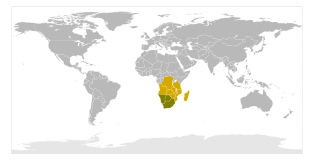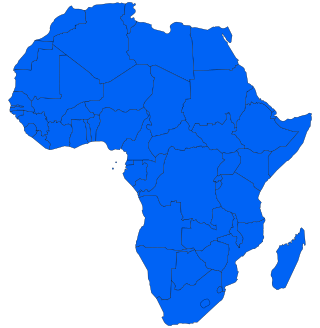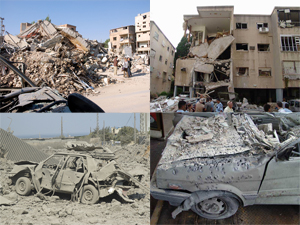
Kofi Atta Annan was a Ghanaian diplomat who served as the seventh secretary-general of the United Nations from 1997 to 2006. Annan and the UN were the co-recipients of the 2001 Nobel Peace Prize. He was the founder and chairman of the Kofi Annan Foundation, as well as chairman of The Elders, an international organisation founded by Nelson Mandela.

United Nations Security Council resolution 1295, adopted unanimously on 18 April 2000, after reaffirming Resolution 864 (1993) and all subsequent resolutions on Angola, particularly resolutions 1127 (1997), 1173 (1998) and 1237 (1999), the Council authorised a tightening of sanctions against UNITA and established a panel of experts to investigation violations of Security Council resolutions imposing measures against UNITA.
United Nations Security Council resolution 1159, adopted unanimously on 27 March 1998, after reaffirming resolutions 1125 (1997), 1136 (1997), 1152 (1998) and 1155 (1998), regarding the situation in the Central African Republic, the council established the United Nations Mission in the Central African Republic (MINURCA).

United Nations Security Council resolution 1170, adopted unanimously on 27 May 1998, after considering the situation across the African continent, the Council decided to establish an ad hoc Working Group to review the Secretary-General Kofi Annan's recommendations concerning the maintenance of international peace and security in Africa.

United Nations Security Council resolution 1177, adopted unanimously on 26 June 1998, after recognising the deteriorating situation between Eritrea and Ethiopia, the Council condemned the outbreak of war and demanded an immediate ceasefire in their border dispute.
United Nations Security Council resolution 1181, adopted unanimously on 13 July 1998, after recalling all previous resolutions on the situation in Sierra Leone, the council established the United Nations Observer Mission in Sierra Leone (UNOMSIL) to monitor the military and security situation in the country for an initial period of six months until 13 January 1999.

The United Nations Security Council resolution 1196 was adopted unanimously on 16 September 1998, after recalling Resolution 1170 (1998) on Africa; the Council discussed the importance of strengthening the effectiveness of arms embargoes in place in several countries across the continent.

United Nations Security Council resolution 1208, adopted unanimously on 19 November 1998, after recalling Resolution 1170 (1998) on Africa, the Council discussed the treatment and status of refugees on the continent.

United Nations Security Council resolution 1209, adopted unanimously on 19 November 1998, after recalling resolutions 1170 (1998) and 1196 (1998) on Africa, the Council addressed illicit arms flows on the continent.

United Nations Security Council resolution 1226, adopted unanimously on 29 January 1999, after reaffirming Resolution 1177 (1998) on the situation between Eritrea and Ethiopia, the Council strongly urged Eritrea to accept an agreement proposed by the Organisation of African Unity (OAU) to resolve the conflict between the two countries.

United Nations Security Council resolution 1265, adopted unanimously on 17 September 1999, in the first resolution to address the topic, the council discussed the protection of civilians during armed conflict.

United Nations Security Council resolution 1271 was adopted unanimously on 22 October 1999, after reaffirming all resolutions on the situation in the Central African Republic, including resolutions 1159 (1998), 1201 (1998) and 1230 (1999). The Council extended the mandate of the United Nations Mission in the Central African Republic (MINURCA) until 15 February 2000 with a view to its transition from a peacekeeping operation to a post-conflict peace-building presence.

United Nations Security Council resolution 1279, adopted unanimously on 30 November 1999, after recalling resolutions 1234 (1999), 1258 (1999) and 1273 (1999) on situation in the Democratic Republic of the Congo, the council established the United Nations Mission in the Democratic Republic of Congo (MONUC) for an initial period until 1 March 2000.
United Nations Security Council resolution 1312, adopted unanimously on 31 July 2000, after reaffirming resolutions 1298 (1999) on the situation between Eritrea and Ethiopia, and 1308 (2000), the council established the United Nations Mission in Ethiopia and Eritrea (UNMEE) in anticipation of a peacekeeping operation subject to future authorisation.

United Nations Security Council resolution 1327, adopted unanimously on 13 November 2000, after recalling Resolution 1318 (2000) adopted at the Millennium Summit and receiving the Report of the Panel on United Nations Peacekeeping, the Council adopted a resolution concerning the improvement of its peacekeeping operations.

United Nations Security Council resolution 1366, adopted unanimously on 30 August 2001, after reaffirming resolutions 1196 (1998), 1197 (1998), 1208 (1998), 1265 (1999), 1296 (1999), 1318 (2000), 1325 (2000) and 1327 (2000) concerning aspects of armed conflict, the Council reiterated its aim to prevent armed conflict as part of its responsibility to maintain international peace and security.

United Nations Security Council resolution 1539, adopted unanimously on 22 April 2004, after recalling resolutions 1261 (1999), 1308 (2000), 1314 (2000), 1325 (2000), 1379 (2001) and 1460 (2003), the council condemned the use of child soldiers and asked the Secretary-General to devise a monitoring mechanism.

United Nations Security Council resolution 1625, adopted unanimously at the 2005 World Summit on 14 September 2005, the Council adopted a declaration on the role of the Security Council in conflict prevention, particularly in Africa where many armed conflicts were taking place.

United Nations Security Council resolution 1631, adopted unanimously on 17 October 2005, after recalling Chapter VIII of the United Nations Charter, the council addressed co-operation between the United Nations and regional organisations in the maintenance of international peace and security.
United Nations Security Council Resolution 1809 was unanimously adopted on 16 April 2008.
















